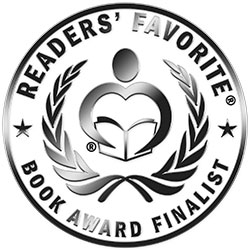
 This author participates in the Readers' Favorite Free Book Program, which is open to all readers and is completely free. The author will provide you with a free copy of their book in exchange for an honest review. You and the author will discuss what sites you will post your review to and what kind of copy of the book you would like to receive (eBook, PDF, Word, paperback, etc.). To begin, click the purple email icon to send this author a private email.
This author participates in the Readers' Favorite Free Book Program, which is open to all readers and is completely free. The author will provide you with a free copy of their book in exchange for an honest review. You and the author will discuss what sites you will post your review to and what kind of copy of the book you would like to receive (eBook, PDF, Word, paperback, etc.). To begin, click the purple email icon to send this author a private email.
![]() This author participates in the Readers' Favorite Book Review Exchange Program, which is open to all authors and is completely free. Simply put, you agree to provide an honest review an author's book in exchange for the author doing the same for you. What sites your reviews are posted on (B&N, Amazon, etc.) and whether you send digital (eBook, PDF, Word, etc.) or hard copies of your books to each other for review is up to you. To begin, click the purple email icon to send this author a private email, and be sure to describe your book or include a link to your Readers' Favorite review page or Amazon page.
This author participates in the Readers' Favorite Book Review Exchange Program, which is open to all authors and is completely free. Simply put, you agree to provide an honest review an author's book in exchange for the author doing the same for you. What sites your reviews are posted on (B&N, Amazon, etc.) and whether you send digital (eBook, PDF, Word, etc.) or hard copies of your books to each other for review is up to you. To begin, click the purple email icon to send this author a private email, and be sure to describe your book or include a link to your Readers' Favorite review page or Amazon page.
![]() This author participates in the Readers' Favorite Book Donation Program, which was created to help nonprofit and charitable organizations (schools, libraries, convalescent homes, soldier donation programs, etc.) by providing them with free books and to help authors garner more exposure for their work. This author is willing to donate free copies of their book in exchange for reviews (if circumstances allow) and the knowledge that their book is being read and enjoyed. To begin, click the purple email icon to send this author a private email. Be sure to tell the author who you are, what organization you are with, how many books you need, how they will be used, and the number of reviews, if any, you would be able to provide.
This author participates in the Readers' Favorite Book Donation Program, which was created to help nonprofit and charitable organizations (schools, libraries, convalescent homes, soldier donation programs, etc.) by providing them with free books and to help authors garner more exposure for their work. This author is willing to donate free copies of their book in exchange for reviews (if circumstances allow) and the knowledge that their book is being read and enjoyed. To begin, click the purple email icon to send this author a private email. Be sure to tell the author who you are, what organization you are with, how many books you need, how they will be used, and the number of reviews, if any, you would be able to provide.

Reviewed by Eduardo Aduna for Readers' Favorite
Looking for Life: A Collection of Science Fiction Short Stories by Clayton Graham is a must-read for all science fiction fans out there. Reminiscent of those anthologies and short stories that propelled the golden age of science fiction, Clayton Graham’s elegant and engaging writing style as well as his grasp of a scene and environment makes every short story an entire adventure in itself.
Clayton Graham has elegantly crafted a superb collection of short stories, where every word matters, and none is wasted. It is not easy to incorporate twists and turns in the small number of words allocated to each story but Graham manages to build solid stories and deliver fulfilling endings. From Verne to Shelley, Asimov, and Bradbury, science fiction has primarily dealt with imagination coupled with two extremes; hope and horror. Graham manages to capture the terrors of the fantastic while sprinkling in the persistent and enduring feeling of hope that underlies the actual journey of the human race.
The author’s exploration of fear and how each impacts behavior, both in mundane and fantastic environments, puts into perspective current real-life situations. Most people look at an anthology of science fiction short stories as something they can breeze through, some light reading on a slow day. However, the impact of each story is enough to make me pause and ruminate afterward, my own imagination soaring starting at the point where the author left off. Each story in Looking for Life is just the tip of the iceberg, a snapshot of unique individual universes ripe for exploration.